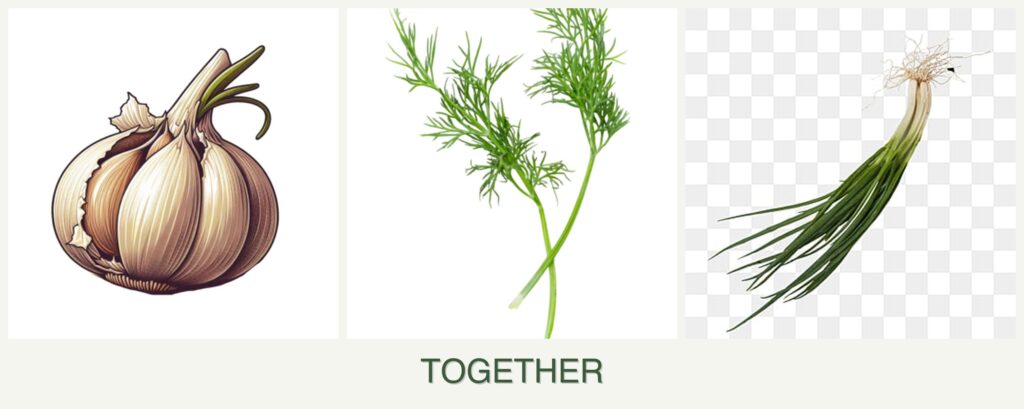
Can you plant garlic, dill and chives together?
Can You Plant Garlic, Dill, and Chives Together?
Companion planting is a popular gardening technique where different plants are grown together to enhance each other’s growth, deter pests, or improve flavor. Garlic, dill, and chives are common herbs and vegetables that gardeners often consider for companion planting. In this article, we’ll explore whether these three plants can be successfully grown together and provide practical tips for doing so.
Compatibility Analysis
Yes, you can plant garlic, dill, and chives together. These plants are compatible due to their similar growth requirements and the benefits they provide one another. Garlic, with its strong scent, acts as a natural pest deterrent, which can help protect dill and chives from common garden pests. Meanwhile, dill attracts beneficial insects like ladybugs and predatory wasps that help control aphid populations, benefiting all three plants.
Key Factors
- Growth Requirements: All three plants prefer well-drained soil and full sun, making them suitable companions.
- Pest Control: Garlic’s natural pest-repelling properties complement dill’s ability to attract beneficial insects.
- Nutrient Needs: These plants have moderate nutrient requirements and do not compete heavily for resources.
- Spacing: Proper spacing ensures each plant has enough room to grow without overcrowding.
Growing Requirements Comparison Table
| Plant | Sunlight Needs | Water Requirements | Soil pH & Type | Hardiness Zones | Spacing Requirements | Growth Habit |
|---|---|---|---|---|---|---|
| Garlic | Full sun | Moderate | 6.0-7.0, loamy | 3-8 | 6-8 inches apart | Upright, 12-18 in. |
| Dill | Full sun | Moderate | 5.5-7.5, sandy | 3-11 | 12-15 inches apart | Bushy, 12-24 in. |
| Chives | Full sun | Moderate | 6.0-7.0, loamy | 3-9 | 8-12 inches apart | Clumping, 12-18 in. |
Benefits of Planting Together
- Pest Repellent Properties: Garlic repels aphids, slugs, and other pests, reducing the need for chemical pesticides.
- Improved Growth: Dill attracts pollinators and beneficial insects, enhancing the growth of nearby plants.
- Space Efficiency: These herbs and vegetables can be interplanted to maximize garden space.
- Soil Health: The varied root structures help aerate the soil and improve its structure.
- Pollinator Attraction: Dill’s flowers attract pollinators, which can benefit the entire garden.
Potential Challenges
- Competition for Resources: Ensure adequate spacing to prevent competition for nutrients and sunlight.
- Different Watering Needs: While all require moderate watering, monitor soil moisture to prevent overwatering.
- Disease Susceptibility: Be vigilant for signs of fungal diseases, especially in damp conditions.
- Harvesting Considerations: Stagger planting times or use succession planting to manage harvests efficiently.
Practical Solutions
- Use raised beds or containers to improve drainage and soil quality.
- Apply mulch to retain moisture and suppress weeds.
- Rotate crops annually to prevent soil-borne diseases.
Planting Tips & Best Practices
- Optimal Spacing: Maintain recommended spacing to ensure healthy growth.
- When to Plant: Plant garlic in the fall, dill in early spring, and chives in spring or fall.
- Container vs. Garden Bed: Containers are suitable for small spaces, but ensure they have drainage holes.
- Soil Preparation: Enrich soil with organic matter before planting.
- Companion Plants: Consider adding marigolds or basil to further enhance pest control and flavor.
FAQ Section
-
Can you plant garlic and dill in the same pot?
- Yes, but ensure the pot is large enough to accommodate their root systems.
-
How far apart should garlic, dill, and chives be planted?
- Garlic: 6-8 inches, Dill: 12-15 inches, Chives: 8-12 inches.
-
Do garlic and dill need the same amount of water?
- Yes, both require moderate watering, but ensure soil drains well.
-
What should not be planted with garlic, dill, and chives?
- Avoid planting garlic with beans and peas, as it can inhibit their growth.
-
Will garlic affect the taste of dill or chives?
- No, garlic does not affect the flavor of nearby dill or chives.
-
When is the best time to plant garlic, dill, and chives together?
- Plant garlic in the fall and dill and chives in early spring for optimal growth.
By understanding the compatibility and requirements of garlic, dill, and chives, you can successfully incorporate these plants into your garden, reaping the benefits of companion planting.



Leave a Reply